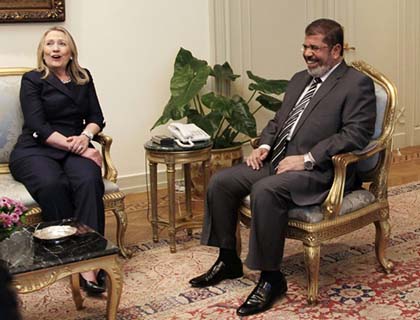CAIRO - US Secretary of State Hillary Clinton on Saturday held talks with new President Mohamed Morsi soon after arriving in Cairo at the start of a visit aimed at lending US support to Egypt's transition to democracy.
"We are very, very keen to meet you and happy you are here," Morsi told Clinton as they went into the meeting at the presidential palace in Cairo's upmarket Heliopolis suburb.
During the two-day visit, the top US diplomat will also meet Field Marshal Hussein Tantawi -- the country's interim military ruler after Hosni Mubarak was ousted in an uprising last year -- as well as women activists and Coptic leaders, US officials said. Clinton will discuss with Egypt's leaders "the steps that the Egyptians are planning to take... on the constitution, on the parliament and the other aspects of institutions that will ultimately result in a full transition to democratic civilian rule," a State Department official told reporters.
"These are questions that only the Egyptians can answer. She's not coming with prescriptions, or with a specific set of proposals but rather is going to seek to understand better how they intend to proceed," the official said.
Clinton steps into the political maelstrom of a complex power struggle between the Islamist president and the Supreme Council of the Armed Forces (SCAF) that ruled Egypt after Hosni Mubarak was ousted last year.
She will seek to "underscore her view that dialogue among the stake-holders to develop a consensus on the way forward is crucial to avoid the kind of instability or confrontation that could derail the transition," the official said.
Last week, Morsi ordered parliament to convene, defying a military decision to disband the house after the country's top court ruled it invalid.
Morsi's decree was applauded by supporters who believed the court's decision to disband parliament was political, but it set off a firestorm of criticism from opponents who accused him of overstepping his authority.
The origins of the battle for parliament lay in the constitutional declaration issued by the SCAF before the president was sworn in.
The declaration, which acts as a temporary constitution, granted the military sweeping powers, including legislative control, and rendered the presidential post little more than symbolic.
Morsi's decision was seen as an opening shot in a power struggle between Egypt's first civilian leader and the Mubarak-appointed generals who wanted to retain broad powers even after they transferred control on June 30.
But on Wednesday, the president said he would respect a court ruling overturning his decree, in an apparent bid to mollify an infuriated judiciary and the military.
During her visit, Clinton will "stress her deep belief that Egypt's democracy can only be successful, and the aspirations of the revolution can only be redeemed if the rights of all Egyptians are protected, including the rights of minorities, including religious minorities and the rights of women," the State Department official said.
The post-revolution rise of the Islamists has raised fears among women and among the country's 10-million-strong Christian community concerning the guarantee of personal freedoms.
Islamists scored a crushing victory in three-stage parliamentary elections held from November last year, with the Muslim Brotherhood -- from which Morsi stepped down before he was sworn in -- heading the lower house.
Treatment of women is something Clinton "certainly worries about and wants to make sure that women's rights and women's opportunities are respected and protected in a new constitution and a new democratic order," said the official.
Morsi has repeatedly pledged to be a president for "all Egyptians" and said he would appoint a woman and a Christian as his deputies.
During the Cairo visit, Clinton will also seek assurances that its key Middle East ally will continue to press for regional security and uphold the peace treaty with Israel.
"She's heard very positive statements from President Morsi in terms of his commitment towards upholding the peace treaty and his desire for Egypt to remain... a cornerstone of regional peace and security," said the official.
"She will stress the view that Egypt's leadership is crucial to the future of the region, to its peace and security and to the future of Egypt itself."
In 1979, Egypt became the first Arab country to sign a peace treaty with Israel. (AFP)

